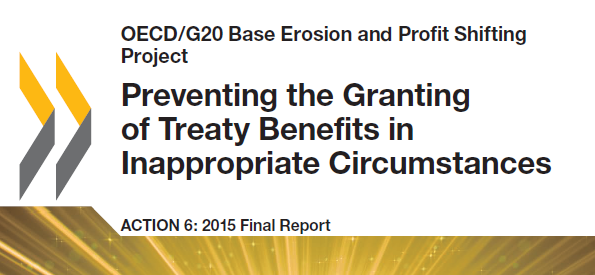BEPS Action 6: Preventing the Misuse of Tax Treaty Benefits

BEPS Action 6, titled Preventing the Granting of Treaty Benefits in Inappropriate Circumstances, is one of the four minimum standards of the Base Erosion and Profit Shifting (“BEPS”) initiative. This means that all BEPS member countries are required to implement this action plan, underscoring its importance and universality.
The primary goal of BEPS Action 6 is to prevent businesses from abusing tax treaty benefits by incorporating various anti-abuse measures into tax treaties, including:
- Adding a declaration in tax treaties to clarify that one of their purposes is to prevent tax evasion or avoidance by creating opportunities for non-taxation or reduced taxation.
- Introducing specific anti-abuse rules such as the Limitation on Benefits (“LOB”) rule, which clearly defines the conditions under which an entity qualifies for treaty benefits, thereby curbing tax avoidance practices.
- Introducing a general anti-abuse rule known as the Principal Purpose Test (“PPT”), which denies treaty benefits if one of the main purposes of a transaction or arrangement is tax avoidance.
- Adding other specific anti-abuse rules, such as minimum holding periods for shares, fixed asset thresholds, and rules for dual tax residents.
- Ensuring that bilateral tax treaties do not override domestic tax rules and anti-avoidance measures, including provisions to allow countries to tax their residents or impose exit taxes on individuals or companies leaving the jurisdiction.
- Providing policy considerations for tax authorities when negotiating bilateral tax treaties, such as avoiding treaties with tax havens or low-tax jurisdictions and proposing amendments to unfair treaties.
Since some aspects of Action 6 are either irrelevant to taxpayers or rarely encountered, this article focuses on the key elements for interpretation.
I. Simplified Limitation on Benefits (“S-LOB”)
One of the main anti-abuse provisions in bilateral tax treaties is the Limitation on Benefits (“LOB”) clause. LOB is a specific anti-avoidance rule (“SAAR”), meaning that unless a taxpayer meets explicitly defined conditions, they cannot enjoy treaty benefits.
The LOB rule originated in the United States, where all tax treaties include an LOB clause. However, due to the complexity of the U.S. version, BEPS Action 6 introduced a simplified version called the Simplified LOB (“S-LOB”). Since most countries adopting the LOB rule have opted for the simplified version, this article will focus on the S-LOB.
1. Qualified Persons
According to the S-LOB clause in the OECD’s 2017 Model Tax Convention, only “qualified persons” (including legal entities and other non-natural persons) are eligible for treaty benefits, with three exceptions. Qualified persons include:
- Individuals (no controversy here).
- Governments and their political subdivisions, agencies, and instrumentalities (entities established to fulfill governmental functions, excluding economic organizations like state-owned enterprises).
- Publicly traded companies and their subsidiaries (since these companies are established for public listing rather than tax avoidance, they are considered low-risk for tax abuse).
- Non-profit organizations or recognized pension funds (typically low-risk for tax avoidance).
- Other entities meeting shareholding and anti-abuse requirements (depending on the specific treaty provisions).
- Collective investment vehicles (also considered low-risk for tax avoidance).
2. Non-Qualified Persons Eligible for Treaty Benefits
Non-qualified persons may still enjoy treaty benefits if they meet one of the following three exceptions:
- They conduct active business operations in their country of residence, with income derived from or incidental to such operations;
- They are owned by qualified persons holding a minimum percentage of shares;
- They are headquarters companies.
These are merely OECD recommendations for the S-LOB clause, and actual provisions depend on specific tax treaties. Companies seeking treaty benefits under an LOB/S-LOB clause must carefully analyze whether they meet the relevant conditions. If they fail to meet the requirements, they generally cannot enjoy treaty benefits unless explicitly provided for in exceptional circumstances within the treaty.
However, BEPS Action 6 does not mandate the adoption of LOB/S-LOB clauses, and in practice, relatively few countries have implemented them. China, for instance, does not adopt LOB clauses, and even in jurisdictions that do, LOB is often used as a supplementary measure alongside other principles. The reasons many countries avoid adopting LOB clauses include:
- LOB does not address many tax avoidance scenarios;
- LOB is relatively complex;
- Tax authorities have limited discretion under LOB.

